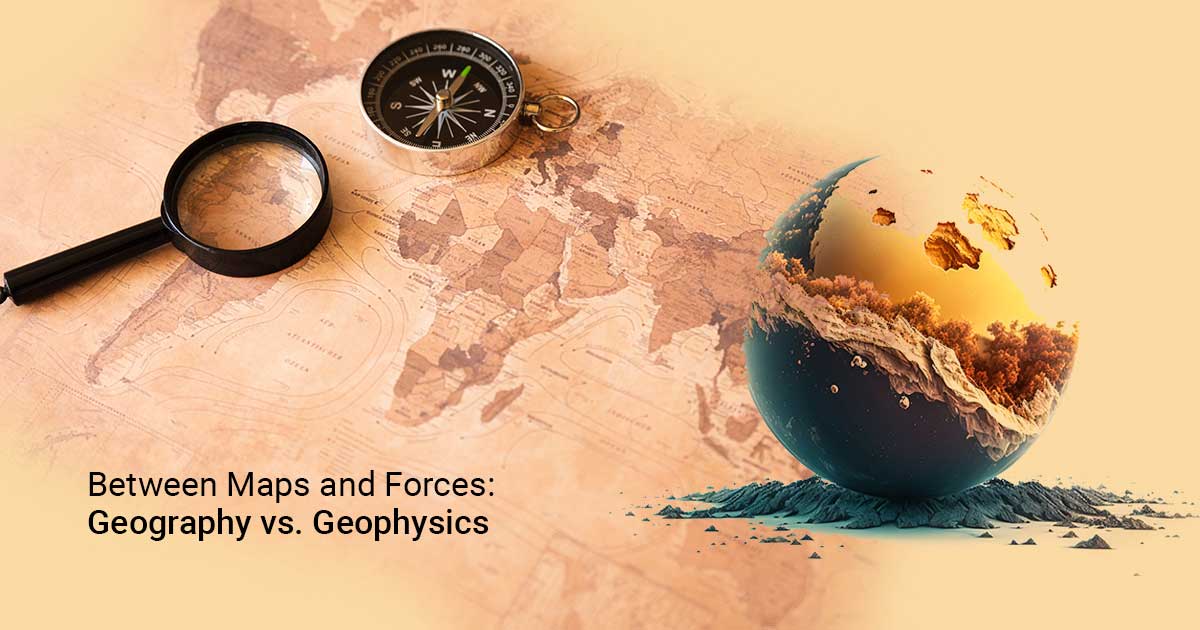Blog Detail


Understanding Earth: Geography vs. Geophysics
22-01-2024

Geography and geophysics are distinct yet interconnected fields exploring the Earth's physical features, processes, and phenomena. While both contribute to our understanding of the planet and there is a significant overlap between the two disciplines, their focuses, methodologies, and applications differ. Both disciplines add to our comprehensive understanding of the planet.
In geography, spatial relationships between physical features, human societies and the environment are examined. The field encompasses various topics, from studying landscapes and climates to analysing human populations and cultural practices. The primary issue of where and why, which relates to the description and classification of the Earth's surface, is addressed by geography. It explores the distribution and behaviour of human populations, their cultures, the effects of human activities on the environment, and natural features such as mountains, rivers, and ecosystems.
Geophysics, on the other hand, is a branch of Earth science that uses physics as its basis to study the physical traits and processes of the Earth. The aim is to understand the composition and structure of the Earth, as well as the dynamic activities taking place below the surface. Seismology, a branch of geophysics, studies earthquakes and seismic wave propagation. Geophysical techniques are also essential in searching for resources like minerals, oil, and groundwater.
Geography explores the spatial relationships of Earth's features and human societies, while geophysics delves into the physical properties and processes beneath the surface. By integrating insights from both disciplines, scientists can better comprehend our world's complex interactions.
Course Duration:
Depending on the programme and level of study, the duration of Geography and Geophysics courses might vary.
Undergraduate programmes in Geography typically last three to four years and result in a Bachelor's degree in Geography. A Master's degree in Geography may take an extra one to two years. Completing a doctoral programme might take three to five years or longer.
Similar to undergraduate Geography programmes, Geophysics undergraduate programmes typically last three to four years. Depending on the required amount of research, Master's programmes in Geophysics often run one to two years, whereas doctorate programmes can span anywhere from three to five years or longer.
Curriculum:
Courses in Geography may cover physical geography, human geography, Geographic Information System (GIS), cartography, environmental studies, and regional geography. There's often flexibility for students to choose specialisations based on their interests. In postgraduate studies, specialisations become more pronounced, and students may delve into advanced topics such as climatology, urban geography, economic geography, or geopolitics.
Foundations in physics, mathematics, and geology are standard in Geophysics. Courses may include seismology, geophysical exploration, gravity and magnetic methods, and earthquake physics. More advanced studies of seismic processing, advanced geophysical methods, and in-depth research projects are part of the postgraduate studies. Specialisations might include exploration geophysics, environmental geophysics, or planetary geophysics.
Career Opportunities:
Career prospects in Geography include cartographer/Geographic Information Systems (GIS) specialist for various applications, including urban planning and environmental management.
- Geographersconsider the social and cultural facets of the landscape to contextualise geophysical data
- Environmental consultants conduct impact assessments and help organisations comply with regulations
- Urban planning designers study the use of land and resources in urban areas
On the other hand, geophysicists help enhance the accuracy and depth of geographic analyses.
- Seismologistswork with organisations focused on earthquake prediction and monitoring
- Researchers in geophysics examine the Earth's magnetic and gravitational fields and seismic activity
- Exploration geophysicists locate and evaluate natural resources such as oil, minerals, and groundwater
- Geophysics scientists learn about the Earth's underlying layers and identify the existence of various materials by examining the behaviour of these waves
- Environmental geophysicists assess environmental impact, monitor pollution, and study the Earth's subsurface for environmental purposes
In summary, while Geography and Geophysics share some commonalities, they have distinct focuses and career paths. Geography tends to have a broader scope, including human and physical aspects, while Geophysics is more specialised in studying the Earth's physical properties. Career prospects depend on individual interests, academic strengths, and specialisations.